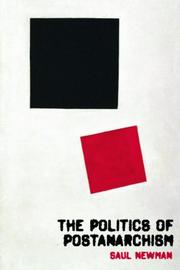
Abstract | Keywords | Export | Availability | Bookmark
 Loading...
Loading...Choose an application
- Reference Manager
- EndNote
- RefWorks (Direct export to RefWorks)
Anarchism --- Anarchism and anarchists --- Anarchy --- Government, Resistance to --- Libertarianism --- Nihilism --- Socialism --- Anarchism.
Book
ISBN: 082328526X Year: 2019 Publisher: New York, NY : Fordham University Press,
Abstract | Keywords | Export | Availability | Bookmark
 Loading...
Loading...Choose an application
- Reference Manager
- EndNote
- RefWorks (Direct export to RefWorks)
The Practical Anarchist brings to light the work of Josiah Warren, eccentric American genius. Devoting his life to showing the practicality of an astonishing ideal, Warren devoted equal industry to the question of how to make a pair of shoes and how to remake the social world into an individualist paradise.This will be the first chance for many readers to encounter Warren’s writings, and in many cases their first publication since their original appearance in obscure, self-published periodicals, including The Peaceful Revolutionist (1833), the first American anarchist periodical. Moreover, they often appeared in a bizarre experimental typography.This volume presents, out of the welter of bewildering writings left by Warren, a reading text designed for today’ readers and students. It seeks to convey the practical value of many of Warren’s ideas, their continuing relevance.
Anarchism --- Warren, Josiah, --- Anarchism and anarchists --- Anarchy --- Government, Resistance to --- Libertarianism --- Nihilism --- Socialism

ISBN: 0710001282 Year: 1979 Publisher: London ; Boston : Routledge & K. Paul,
Abstract | Keywords | Export | Availability | Bookmark
 Loading...
Loading...Choose an application
- Reference Manager
- EndNote
- RefWorks (Direct export to RefWorks)
Anarchism --- Anarchism and anarchists --- Anarchy --- Political philosophy. Social philosophy --- Government, Resistance to --- Libertarianism --- Nihilism --- Socialism --- Anarchism.
Book
ISBN: 1435658736 9781435658738 0791478351 Year: 2008 Publisher: Albany State University of New York Press
Abstract | Keywords | Export | Availability | Bookmark
 Loading...
Loading...Choose an application
- Reference Manager
- EndNote
- RefWorks (Direct export to RefWorks)
In Against the State, Crispin Sartwell unleashes a quick and brutal rejection of the traditional arguments for state legitimacy. Sartwell considers the classics of Western political philosophy—Hobbes, Locke, Rousseau, Hegel, Hume, Bentham, Rawls, and Habermas, among others—and argues that their positions are not only wrong but also embarrassingly bad. He separates the traditional pro-state arguments into three classes: social contract theories, utilitarian justifications, and justicial views, all while attacking both general strategies and particular formulations. Sartwell argues that the state rests on nothing but deadly force and its accompanying coercion, and that no one is under any obligation to obey the law merely because it is the law. He concludes by articulating a positive vision of an anarchist future, based on the "individualism" of such figures as Emerson and Thoreau. Against the State provides a rigorous and provocative foil to the classic texts, and also serves as a concise statement of the anarchist challenge.
Anarchism. --- Anarchism and anarchists --- Anarchy --- Government, Resistance to --- Libertarianism --- Nihilism --- Socialism

ISBN: 074865416X 0748652841 1282620231 9786612620232 0748634975 9780748634972 9780748634965 0748634967 9780748654161 9780748634958 0748634959 Year: 2010 Publisher: Edinburgh : Edinburgh University Press,
Abstract | Keywords | Export | Availability | Bookmark
 Loading...
Loading...Choose an application
- Reference Manager
- EndNote
- RefWorks (Direct export to RefWorks)
Articulates the intersection of anarchism and poststructuralism in order to frame a new approach to politics: postanarchism.
Anarchism --- Anarchism and anarchists --- Anarchy --- Government, Resistance to --- Libertarianism --- Nihilism --- Socialism --- Philosophy. --- Political philosophy. Social philosophy
Book
ISBN: 1443851051 9781443851053 9781443847681 1443847682 Year: 2013 Publisher: Newcastle upon Tyne Cambridge Scholars Pub.
Abstract | Keywords | Export | Availability | Bookmark
 Loading...
Loading...Choose an application
- Reference Manager
- EndNote
- RefWorks (Direct export to RefWorks)
This collection of articles contains the English contributions to the 4th Austrian Students' Conference of Linguistics (Österreichische Studierenden-Konferenz der Linguistik, ÖSKL), which was held in November 2011 at the University of Innsbruck. With this collection, the editors want to make the insights and the knowledge presented at the 4th ÖSKL available in written format to a wider public. The contributions present in this collection are excerpts from PhD as well as diploma theses and seminar papers. The fifteen papers collected in this volume are very diverse, as are the authors themselve
Anarchism. --- Anarchism and anarchists --- Anarchy --- Government, Resistance to --- Libertarianism --- Nihilism --- Socialism
Book
ISBN: 9004251952 9789004251953 1299975690 9781299975699 9789004251946 9004251944 Year: 2013 Publisher: Leiden
Abstract | Keywords | Export | Availability | Bookmark
 Loading...
Loading...Choose an application
- Reference Manager
- EndNote
- RefWorks (Direct export to RefWorks)
American Anarchism by Steve J. Shone is a work of political theory and history that focuses on nineteenth century American Anarchism, together with two European anarchists who influenced some of the Americans. The nine thinkers discussed are Alexander Berkman, Voltairine de Cleyre, Samuel Fielden, Luigi Galleani, Peter Kropotkin, Lucy Parsons, Max Stirner, William Graham Sumner, and Benjamin Tucker. Shone emphasizes the value of using ideas from nineteenth century American Anarchism to solve contemporary political problems.
Anarchism --- Anarchism and anarchists --- Anarchy --- Government, Resistance to --- Libertarianism --- Nihilism --- Socialism --- History
Book
ISBN: 9004252991 9789004252998 9789004214965 9004214968 9789004214 9789789004218 Year: 2013 Publisher: Leiden
Abstract | Keywords | Export | Availability | Bookmark
 Loading...
Loading...Choose an application
- Reference Manager
- EndNote
- RefWorks (Direct export to RefWorks)
Anarchy and Society explores the many ways in which the discipline of Sociology and the philosophy of anarchism are compatible. The book constructs possible parameters for a future ‘anarchist sociology’, by a sociological exposition of major anarchist thinkers (including Kropotkin, Proudhon, Landauer, Goldman, and Ward), as well as an anarchist interrogation of key sociological concepts (including social norms, inequality, and social movements). Sociology and anarchism share many common interests—although often interpreting each in divergent ways—including community, solidarity, feminism, crime and restorative justice, and social domination. The synthesis proposed by Anarchy and Society is reflexive, critical, and strongly anchored in both traditions.
Anarchism. --- Sociology. --- Social theory --- Social sciences --- Anarchism and anarchists --- Anarchy --- Government, Resistance to --- Libertarianism --- Nihilism --- Socialism
Book
ISBN: 0691620253 0691647054 0691007667 1400872480 1322886776 9781322886770 9781400872480 0691051518 Year: 2015 Publisher: Princeton University Press
Abstract | Keywords | Export | Availability | Bookmark
 Loading...
Loading...Choose an application
- Reference Manager
- EndNote
- RefWorks (Direct export to RefWorks)
Professor Avrich records the history of the anarchist movement from its Russian origins in the 19th century, with a full discussion of Bakunin and Kropotkin, to its upsurge in the 1905 and 1917 Social Democratic Revolutions, and its decline and fall after the Bolshevik Revolution. While analyzing the role of the anarchists in these fateful years, he traces the close relationships between the anarchists and the Bolsheviks and shows that the Revolutions were conceived in spontaneity and idealism and ended in cynical repression. The Russian anarchists saw clearly the consequences of a Marxist "dictatorship of the proletariat" and, though they had no single cohesive organization, repeatedly warned that the Bolsheviks aimed to replace the tyranny of the tsars with a tyranny of commissars.Originally published in 1967.The Princeton Legacy Library uses the latest print-on-demand technology to again make available previously out-of-print books from the distinguished backlist of Princeton University Press. These editions preserve the original texts of these important books while presenting them in durable paperback and hardcover editions. The goal of the Princeton Legacy Library is to vastly increase access to the rich scholarly heritage found in the thousands of books published by Princeton University Press since its founding in 1905.
Anarchists --- Anarchism --- Anarchism and anarchists --- Anarchy --- Government, Resistance to --- Libertarianism --- Nihilism --- Socialism --- History.

ISBN: 1135408920 1135408998 020395551X 9781135408923 9780203955512 0415949033 9780415949033 9781135408992 9781135409067 9780415726320 Year: 2004 Publisher: New York
Abstract | Keywords | Export | Availability | Bookmark
 Loading...
Loading...Choose an application
- Reference Manager
- EndNote
- RefWorks (Direct export to RefWorks)
Communitarian anarchism is a generic form of socialism that denies the need for a state or any other authority over the individual from above, and which requires absolute belief that the individual cannot exist outside of a community of others. This book suggests that the communitarian anarchists of the nineteenth century developed and articulated a distinct tradition of economic thought. The period of this study begins with the first major writing of the French communitarian anarchist, Pierre-Joseph Proudhon, in 1840 and ends with the temporary burial of anarchist theorizing at the beginning
Anarchism --- Communitarianism --- Social structure --- Anarchism and anarchists --- Anarchy --- Government, Resistance to --- Libertarianism --- Nihilism --- Socialism --- Economic aspects.

 Search
Search Feedback
Feedback About UniCat
About UniCat  Help
Help News
News